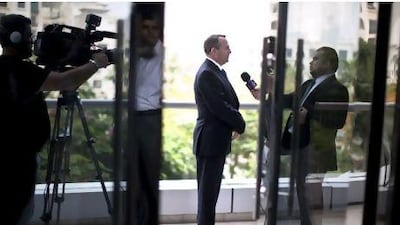DUBAI // The British military presence in the Gulf will continue despite cuts in defence spending, the UK defence secretary says.
"We'll not be reducing, full stop," said Liam Fox, who was speaking at The Address hotel in Downtown Dubai on a stopover from Afghanistan.
MORE UAE NEWS: Our pick of today's top local news stories
Last Updated: June 20, 2011
One in four young Emirati men dropping out Almost a quarter of Emirati men aged between 20 and 24 drop out of high school and will never return to education, new study shows. Read
Fuel shortage could be eased Several new Adnoc stations are being built in the Northern Emirates with hopes that at least two will be finished by next month. Read article
Search continues for freediver Family still holds out hope for missing Emirati freediving champion Adel Abu Haliqa while second search is called off almost three weeks after he disappeared. Read article
British presence in Gulf secure, says Fox Largest military spending review in decades to tackle Britain's mountain of debt will not deter government's renewed focus on region.
"There'll be no reduction to our commitment to this region either in training and exercise, involvement or in the deployment of our forces in this region."
The region has faced renewed focus from the current British government.
"This region is too important to see any reduction in a military relationship here," Dr Fox said.
British military spending is facing the largest budget review in decades, but he insisted it would "allow us to invest in increased military capability towards the end of the decade".
"We need to be able to invest in future carrier strike and joint strike fighters, but we need to maintain the number of Challenger battle tanks," Dr Fox added.
He said the British coalition government, in power since last May, was more focused on the Gulf than its predecessor. "We regard the Gulf as being key to our own security, regional security, and to the fight in transnational terrorism."
On the response by Arab governments to protests in their countries, Dr Fox said the best solution was political process, not repression.
"It is very clear that a younger generation wants to be able to enjoy freedoms that they see through TV and through the internet," he said. "And that process of change will ultimately be irresistible.
"Those who don't allow change to be a process will find it becomes an event. History should give us a very clear warning now."
In Bahrain in particular, "there needs to be an accommodation … that provides long-term stability that requires both sides to work together, so that the process of change is not hijacked by the more extreme views on both sides", Dr Fox said.
The British presence in the UAE has undergone what Guy Warrington, the British consul general in Dubai, recently called "a major strategic shift" in recent months.
"Our overall presence in the UAE is over 400 people working for the British government," Mr Warrington said. "That makes it one of the largest diplomatic operations in the world."
The UAE is the centre of the UK focus in the Gulf partly because of the large British population.
"This is the centre of our consular operation in the Gulf," Mr Warrington said. "That logic applies to other aspects of the embassy's business.
"We have our regional trade and investment hub here and a regional visa hub and regional training centre here. There's a business logic for that. It's also where the British companies choose to put their regional headquarters."
Regional unrest has played a part in this shift in focus.
"We've been given the additional resources already," Mr Warrington said. "The department has been massively reinforced because of what's been happening in the region."
There has been a renewed focus on soft power, especially after the global publicity garnered by the British royal wedding in April.
"We've got an extremely active British Council here," Mr Warrington said. "There are over 50 schools teaching the British syllabus. They're all taking British exams. There are more British universities than any other universities.
"There were more British acts, bands, theatre companies than any other country."
The new coalition government has been partly responsible for the shift, Mr Warrington said.
"We've had visits by the prime minister, visits by the Queen, the Duke of York, minister of defence - a string of ministers from DTI [the department of trade and industry], to DECC [department of energy and climate change].
"We've had a higher density of visits in that time than probably any time in UK-UAE history."
All that is buttressed by financial ties, including the Dubai ports company DP World's Dh9.6 billion investment in the London Gateway ports project.
"It's the largest foreign infrastructure investment that's ever been made in the UK and we are very grateful to DP World for funding it," Mr Warrington said.
hhamid@thenational.ae

